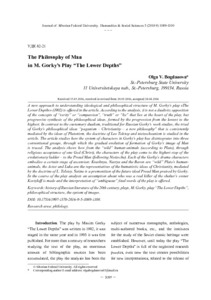The Philosophy of Man in M. Gorky’s Play “The Lower Depths”
Скачать файл:
URI (для ссылок/цитирований):
https://elib.sfu-kras.ru/handle/2311/20257Автор:
Bogdanova, Olga V.
Богданова, О.В.
Дата:
2016-05Аннотация:
A new approach to understanding ideological and philosophical structure of M. Gorky’s play «The
Lower Depths» (1902) is offered in the article. According to the analysis, it is not a dualistic opposition
of the concepts of “verity” or “compassion”, “truth” or “lie” that lies at the heart of the play, but
progressive synthesis of the philosophical ideas, formed by the progression from the lowest to the
highest. In contrast to the customary dualism, traditional for Russian Gorky’s work studies, the triad
of Gorky’s philosophical ideas “paganism – Christianity – a new philosophy” that is consistently
mediated by the ideas of Platonism, the doctrine of Leo Tolstoy and nietzscheanism is studied in the
article. The article studies how the system of characters in Gorky’s play has disintegrates into three
conventional groups, through which the gradual evolution of formation of Gorky’s image of Man
is traced. The analysis shows how from the “wild” human-animals (according to Plato), through
religious acceptance of one God (Christ), the characters of the play come to the highest step of the
evolutionary ladder – to the Proud Man (following Nietzsche). Each of the Gorky’s drama characters
embodies a certain stage of ascension: Kvashnya, Nastya and the Baron are “wild” Plato’s humananimals,
the Actor and Luka are the representatives of the humanistic ideas of Christianity, mediated
by the doctrine of L. Tolstoy, Satine is a premonition of the future ideal Proud Man praised by Gorky.
In the course of the play analysis an assumption about who was a real killer of the shelter’s owner
Kostylоff is made and the interpretation of “ambiguous” final words of the play is offered В статье предлагается новый взгляд на понимание идейной и философской структуры
пьесы М. Горького «На дне» (1902). Как показывает анализ, в основе пьесы лежит не
дуалистическое противопоставление концептуальных понятий «истина» и «сострадание»,
«правда» и «ложь», но поступательный синтез философских идей, сформированных
движением от низшего к высшему. В отличие от привычного дуализма, традиционного для
отечественного горьковедения, в статье рассматривается триада горьковских философем
«язычество – христианство – новая философия», последовательно опосредованных
идеями платонизма, толстовства и ницшеанства. В статье рассматривается, как
система персонажей пьесы Горького распадается на три условные группы, посредством
которых прослеживается поэтапная эволюция формирования горьковского образа
Человека. Анализ показывает, как от «диких» людей-зверей (по Платону) через религиозно
уверовавших в единого Бога (Христа) герои Горького поднимаются на высшую ступень
эволюционной лестницы – к Гордому Человеку (вслед за Ницше). Каждый из героев драмы
Горького воплощает определенную степень восхождения: Квашня, Настя, Барон –
«дикие» платоновские люди-звери, Актер и Лука – представители гуманистических идей
христианства, опосредованного толстовством, Сатин – предвестие идей будущего
идеального Гордого Человека, воспеваемого Горьким. В ходе анализа пьесы высказывается
предположение о том, кто в действительности убил хозяина ночлежки Костылева и
предлагается интерпретация «двусмысленной» финальной фразы пьесы
Коллекции:
Метаданные:
Показать полную информациюСвязанные материалы
Показаны похожие ресурсы по названию, автору или тематике.
-
Game as a Means to Fulfill the Creative Potential of Children and Young People
Golosova, Olesya A.; Голосова, О.А. (Сибирский федеральный университет. Siberian Federal University, 2016-06)The article is devoted to the issues of development of the game culture of celebrations and game technologies in the work with university and school students. The author reveals the major objectives and functions of game, ... -
The Semantics of Russian Life at the Lessons of Russian as a Foreign Language: Linguistic and Methodological Aspects (a Case Study)
Tarasenko, Tatiana V.; Тарасенко, Т.В. (Сибирский федеральный университет. Siberian Federal University., 2015-01)This article is dedicated to the semantics of Russian life through the situation of alcohol drinking, and analysis of the linguistic aspect of the situation of alcohol drinking, the technique of studying the situation ... -
Practical Approach to the Concept of Lifelong Learning in Linguistic Professional Education (on the Example of Special Field “State and Municipal Governance”)
Zubkova, Olga M.; Ivanova, Elena G.; Nadezhdina, Elena Y.; Shaturnaya, Elena A.; Зубкова, О.М.; Иванова, Е.Г.; Надеждина, Е.Ю.; Шатурная, Е.А. (Сибирский федеральный университет. Siberian Federal University, 2015-11)The article discusses a topical issue of developing a system of ongoing education, which views a foreign language acquisition as an impartial element of enhancement of communicative and intercultural competences level ... -
Youth Subculture of RPG Community: On the Problem of Methodological Description
Kopytin, Sergei M.; Копытин, С.М. (Сибирский федеральный университет. Siberian Federal University, 2016-06)The paper offers an analysis of traditional and contemporary methodological approaches to studying of youth subcultures. The author looks into structural, functional, deviant, hermeneutic, semiotic, sociological aspects; ... -
Время культуры в игре металептики художественного перевода
Куницына, Е.Ю.; Kunitsyna, Evgenia Yu. (Сибирский федеральный университет. Siberian Federal University., 2010-10)The article addresses the problem of strategy in literary translation from the viewpoint of the time of the culture and compatibility of cultural signs. Foreignizing and domesticating translation strategies are considered ...

